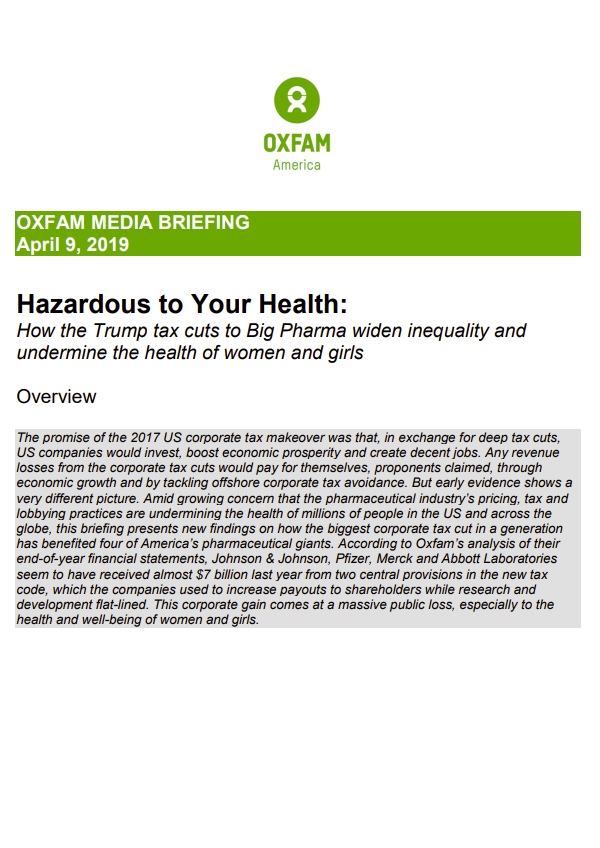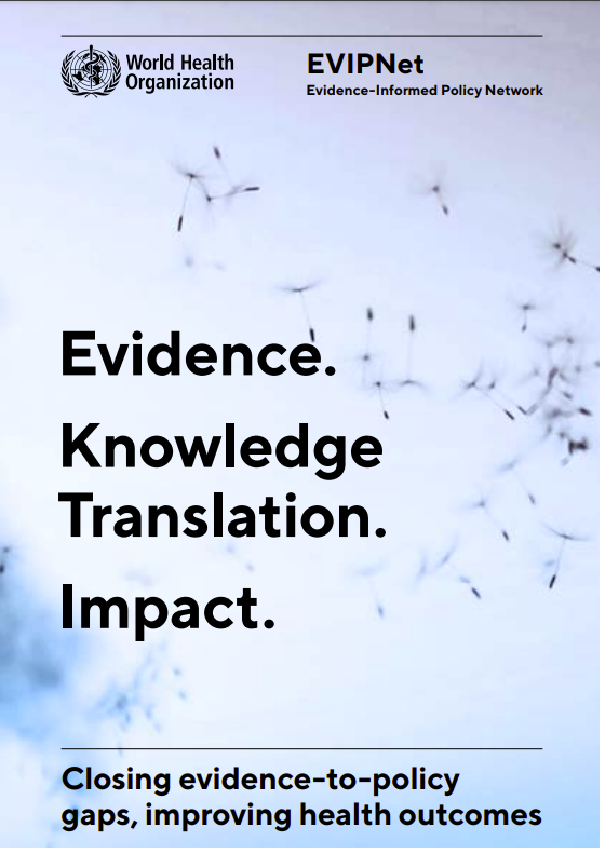The promise of the 2017 US corporate tax makeover was that, in exchange for deep tax cuts, US companies would invest, boost economic prosperity and create decent jobs. Any revenue losses from the corporate tax cuts would pay for themselves, proponents claimed, through economic growth and by tackling offshore corporate tax avoidance. But early evidence shows a very different picture. Amid growing concern that the pharmaceutical industry’s pricing, tax and lobbying practices are undermining the health of millions of people in the US and across the globe, this briefing presents new findings on how the biggest corporate tax cut in a generation has benefited four of America’s pharmaceutical giants. According to Oxfam’s analysis of their end-of-year financial statements, Johnson & Johnson, Pfizer, Merck and Abbott Laboratories seem to have received almost $7 billion last year from two central provisions in the new tax code, which the companies used to increase payouts to shareholders while research and development flat-lined. This corporate gain comes at a massive public loss, especially to the health and well-being of women and girls.
Disease does not differentiate between rich and poor, but in the US and the world, medicines do. By failing to pay their fair share in taxes and charging high prices for medicines, pharmaceutical companies are ultimately denying access to health care and other essential public investments so vital to combat gender, racial and economic inequalities in the US and around the world.
In advance of Tax Day in the United States, there’s a growing concern that the pharmaceutical industry’s exorbitant pricing, tax avoidance and lobbying practices are undermining the health of millions of people in the US and across the globe. This briefing presents new findings on how the biggest corporate tax cut in a generation—the 2017 Tax Cuts and Jobs Act (TCJA)—has benefited four of America’s pharmaceutical giants. This follows Oxfam’s Prescription for Poverty study released last year, which revealed that Johnson & Johnson (J&J), Merck, Pfizer and Abbott Laboratories may have underpaid $3.7 billion in taxes annually around the world by systematically shifting their profits to overseas tax havens between 2013 and 2015. Of that, the US may have lost $2.3 billion annually to just these four companies’ profit-shifting practices.
The promise of the 2017 US corporate tax cuts was that, in exchange for deep tax cuts, US companies would invest, boost economic prosperity and create jobs. Any revenue losses from the corporate tax cuts would pay for themselves, proponents claimed, through economic growth and by tackling offshore corporate tax avoidance. While it’s still early, there is very little evidence that these four US pharmaceutical companies have ended their use of offshore tax havens or meaningfully invested in the US, according to Oxfam’s analysis of their end-of-year financial statements. What’s more, Johnson & Johnson, Pfizer, Merck and Abbott Laboratories seem to have received almost $7 billion last year from two of the main provisions in the new tax code ($1.7 billion from the corporate tax rate cut and $5.3 billion from the tax break on previously untaxed offshore earnings). Pfizer topped the list with an estimated $2.8 billion in tax savings, followed by Johnson & Johnson at $2.5 billion, Merck at $1.2 billion and Abbott at $473 million.
This corporate gain comes at a massive public loss, especially to the health and well-being of women and girls. When health care funding is cut due to tax shortfalls, families lose medical care, and can be driven into poverty by health care debts. When health systems are under-funded, women and girls’ own rights to health are placed in jeopardy while at the same time they are asked to step into the breach to provide unpaid care for their sick loved ones—compromising their own health and their prospects for education and employment. What’s more, when governments and US states are deprived of corporate tax revenues, they often seek to balance the budget by raising consumption taxes, which tend to take a larger bite out of the income of poorer women. This is what happens when tax money, which could have been spent on the public good, is diverted to some of the world’s most profitable firms. For perspective, the $6.9 billion in tax breaks that just these four companies received in 2018 could have paid.











